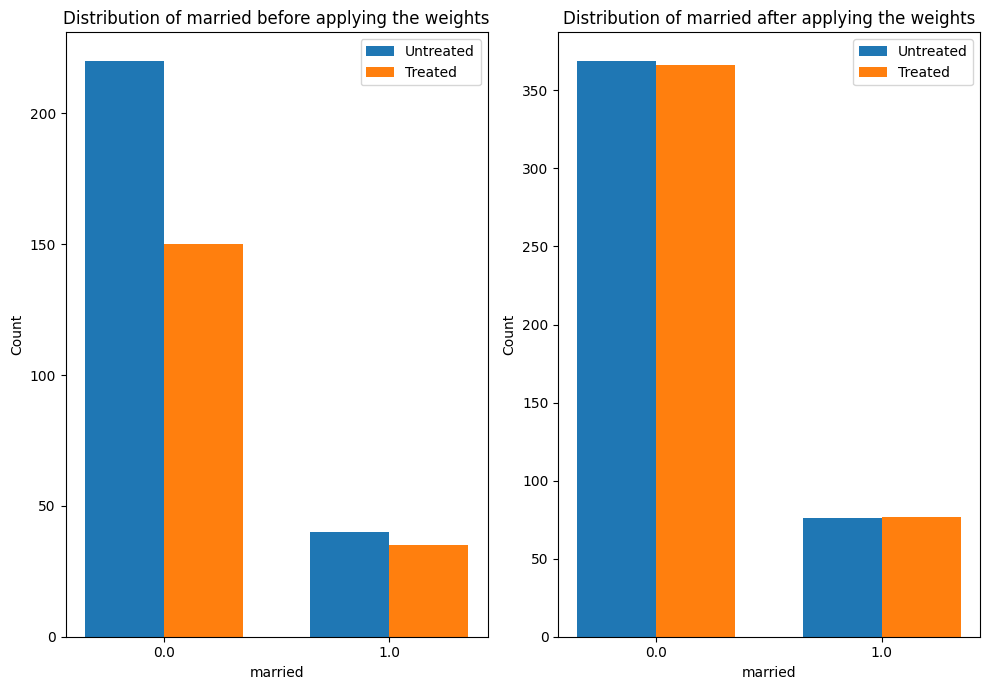Lalonde数据集上的DoWhy示例#
感谢 [@mizuy](mizuy) 提供这个示例。这里我们使用 Lalonde 数据集并对其应用 IPW 估计器。
1. 加载数据#
[1]:
import dowhy.datasets
lalonde = dowhy.datasets.lalonde_dataset()
2. 运行DoWhy分析:建模、识别、估计#
[2]:
from dowhy import CausalModel
model=CausalModel(
data = lalonde,
treatment='treat',
outcome='re78',
common_causes='nodegr+black+hisp+age+educ+married'.split('+'))
identified_estimand = model.identify_effect(proceed_when_unidentifiable=True)
estimate = model.estimate_effect(identified_estimand,
method_name="backdoor.propensity_score_weighting",
target_units="ate",
method_params={"weighting_scheme":"ips_weight"})
print("Causal Estimate is " + str(estimate.value))
import statsmodels.formula.api as smf
reg=smf.wls('re78~1+treat', data=lalonde, weights=lalonde.ips_stabilized_weight)
res=reg.fit()
res.summary()
Causal Estimate is 1639.8254852564396
[2]:
| 因变量: | re78 | R平方: | 0.015 |
|---|---|---|---|
| 模型: | WLS | 调整后的R平方: | 0.013 |
| 方法: | 最小二乘法 | F统计量: | 6.743 |
| 日期: | 2024年11月24日 星期日 | 概率 (F统计量): | 0.00972 |
| 时间: | 18:09:33 | 对数似然: | -4544.7 |
| 观测数量: | 445 | AIC: | 9093. |
| 自由度残差: | 443 | BIC: | 9102. |
| 自由度模型: | 1 | ||
| 协方差类型: | 非稳健 |
| 系数 | 标准误差 | t值 | P>|t| | [0.025 | 0.975] | |
|---|---|---|---|---|---|---|
| 截距 | 4555.0717 | 406.705 | 11.200 | 0.000 | 3755.761 | 5354.383 |
| treat[T.True] | 1639.8255 | 631.496 | 2.597 | 0.010 | 398.725 | 2880.926 |
| 综合统计量: | 303.265 | Durbin-Watson: | 2.085 |
|---|---|---|---|
| 概率(Omnibus): | 0.000 | Jarque-Bera (JB): | 4770.724 |
| 偏度: | 2.709 | JB概率: | 0.00 |
| 峰度: | 18.097 | 条件编号 | 2.47 |
Notes:
[1] Standard Errors assume that the covariance matrix of the errors is correctly specified.
3. 解释估计#
下面的图表显示了混杂因素“已婚”的分布如何从原始数据变为加权数据。在这两个数据集中,我们比较了“已婚”在处理和未处理单位之间的分布。
[3]:
estimate.interpret(method_name="confounder_distribution_interpreter",var_type='discrete',
var_name='married', fig_size = (10, 7), font_size = 12)

4. 完整性检查:与手动IPW估计进行比较#
[4]:
df = model._data
ps = df['propensity_score']
y = df['re78']
z = df['treat']
ey1 = z*y/ps / sum(z/ps)
ey0 = (1-z)*y/(1-ps) / sum((1-z)/(1-ps))
ate = ey1.sum()-ey0.sum()
print("Causal Estimate is " + str(ate))
# correct -> Causal Estimate is 1634.9868359746906
Causal Estimate is 1639.8254852564378